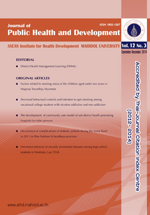Stroke Knowledge among Various Suburban Communities in Northeastern Thailand
Main Article Content
Abstract
Stroke is a serious and increasing problem in Thailand. The aims of this study were to assess knowledge of stroke in a Thai population and to identify factors associated with lack of knowledge in two topics where this was weakest. The participants in this cross-sectional study were 781 residents of Northeastern Thailand over 18 years of age. Interview data were analysed using descriptive statistics and multiple logistic regression.
Although knowledge about stroke risk factors was generally high, only 57.9% knew that hypertension was a risk. Most (66%) could correctly recognise all the listed stroke symptoms, but only 31.4 % knew that the first reaction to stroke symptoms should be dialling the medical emergency number. In the multivariate logistic regression analysis, the variables associated with unawareness that hypertension is a stroke risk factor were education to high school level or above, a history of hypercholesterolemia and no family history of stroke. The factors associated with disagreement that the immediate response to a stroke event should be to ring the medical emergency number were age and occupation.
Knowledge of stroke symptoms was surprisingly high, but this should be confirmed in other Thai populations. Systems for identifying hypertension need to be more widely used and accompanied by explicit information about stroke risk. Locally, further research is needed about the reasons for not immediately contacting the emergency service. The benefits of calling the service should be a major focus of any new public information campaign.


